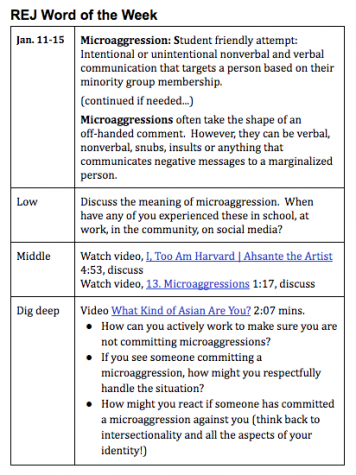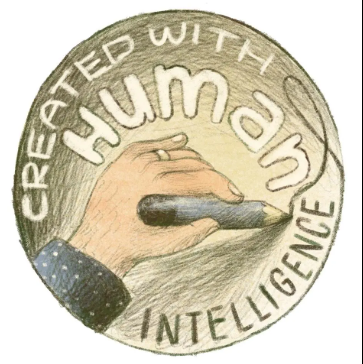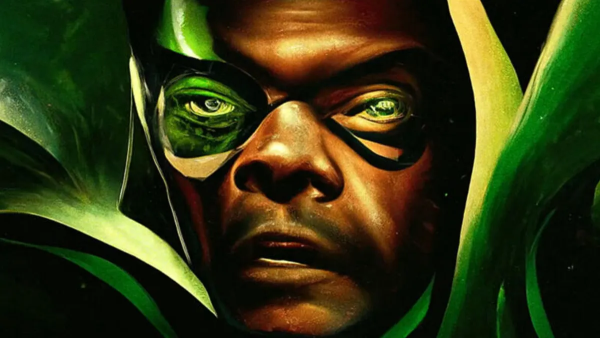What’s up with Word of the Week?
A recent addition to Bothell High School’s virtual campus this year is a new racial justice initiative called Word of the Week (WoW), created by Bothell’s Racial Educational Justice Committee. Each week, a word is chosen to be the focal point of conversations in classrooms to encourage students and teachers to engage in social justice learning. Some of the past words have been: Honor, microaggression, empathy, justice, intersectionality, and community. Wendy Wands, campus supervisor, climate and culture advisor, and member of both the district’s and Bothell’s Racial Educational Justice Committee, tells me that the purpose of WoW is to “[step] toward having our campus be much better prepared for social justice… just a start to try to get collectively, Bothell High together.” Knowing the purpose, I asked a couple of students if WoW achieved that goal. “At the very least, it’s introducing things… they’re saying the definitions but that doesn’t say much… You could Google that in half a second…” says Taylor Zundel (‘22). “I thought it would be a good way to introduce social justice… [the district] kind of promised it over the summer… a lot of the words were related towards social justice and allyship but none of the teachers really did anything about it,” says Diya Kumar (‘22).
Bothell’s WoW has great intentions and high expectations behind it so I was curious to follow up with some students to see how it’s going. “One out of my seven teachers actually talks about Word of the Week” says Zundel. That’s more than me, none of my teachers have even acknowledged WoW. Sometimes I hear it on the morning announcements but the only time I ever actually engage in meaningful conversation is after school, in Key Club. “It’s not really much incorporation into anything. It’s more of just like acknowledging and moving on,” Zundel says “and sometimes they don’t even do that” Siya Sharma (‘21) adds. Teachers might as well not address it at all if they can’t expand further than a definition. “I think they have the right intentions, they’re just not following through with it as they should be,” says Zundel. A response from the Catamount survey would agree, “I think it’s a good idea with bad execution,” says one student, “We’re really engaged… a lot of people want to talk about these words… If you gave these kids an opportunity to talk, they really would want to and they have a lot to touch on” says Kumar. Students care a lot more about social justice than teachers realize because a lot of the time, we can personally relate to what these words encompass. “It’s really disappointing because it’s there and it has that potential and it’s a good tool for teachers to use… a lot of [teachers] don’t acknowledge that,” says Sharma. The feedback from these students should be a wake-up call to teachers that for WoW to be effective, something needs to change.
Some students have voiced that they think that WoW is too small of a step to make meaningful change or that it is a performative gesture, “it invalidates the students who have experiences related to the words, and amounts our struggle to a five [minute] or [less] discussion in class” reads a response from the survey. I would agree but we all have to start somewhere. Something is better than nothing so I’ll take what I can get. Many other students have also tried their best to make the most out of WoW. A survey response says, “Most of the words I think I know, but I don’t really. It’s cool to learn the actual definitions that I probably wouldn’t take the time to learn on my own.” Zundel adds, “it opens up to me doing my own research.” “We did one WoW lesson where it was something about our identities… it made me aware of how many people actually fit certain identities…” Kumar says, touching on a discussion that they had in her choir class about the word “intersectionality”. All students and teachers can benefit from WoW in big and small ways. Even beyond school hours, Kumar tells me about how she and her parents sometimes talk about WoW and are able to participate in these discussions with their own different generational lenses and backgrounds. Kumar says that WoW has made her more aware in her life outside of school like “checking [her] own microaggressions that [she] might have and just how [she is] incorporating allyship into [her] daily life.” Another survey response says, “I think it’s good to hear other people’s opinions on these important matters and to reflect on yourself if how you are handling these situations is respectful for everyone or if you let prejudices determine your actions”
Many students were under the impression that it was up to the individual teachers to create a lesson plan or a discussion structure about WoW, which is why many of us did not have high expectations as we know that teachers have limited time and resources to indulge in non-academic activities. Each class only meets twice a week so there is not much time to spare. Except that there is. Most teachers don’t use the full hour and 20 minutes in their period and allow their students to leave early to work asynchronously or just have a longer break before their next class. “Six of [my] seven classes on average a week get out early,” Zundel says. In the survey, I found that 37% of students regularly get let out early in 2 or more of their classes and on average, 45.5% are let out 20-30 minutes early, some even more than that. I can’t speak for all students when I say that I would be more than willing to stay after class for five or ten minutes to talk about WoW instead of leaving early. “For the teachers that use up all 80 minutes and more of their class time, it can happen for sure” Sharma says. If teachers can fill 80 minutes with academic material, can’t they spare 5 minutes for a quick discussion about one of the most relevant topics that affects everyone?
I also learned that the teachers are provided with a very helpful guide as to how to approach these topics with their students as well as additional resources like short videos.

The above chart is what is included in the bulletin that teachers receive on Fridays. As you can see, teachers are provided with more than enough information to guide a short or even long class discussion. All of the tools are there, it is just up to the teachers to take initiative. “We put it there for a reason, to have conversations… If you can’t have these conversations about what goes on in our world then you’re losing out on being educated… You can’t just have your eyes shut” says Wands.
So why should teachers care about WoW? Simply put, “because it brings up the conversation of social justice that we need to have,” Wands says. It doesn’t have to be difficult, “some of our WoW can very easily be intertwined with history lessons… other WoW could be intertwined with science…” Zundel tells me. English as well! Many English classes read extremely socially relevant books such as To Kill A Mockingbird and Animal Farm. “It’s there as an opportunity to have deeper connections with your students…” says Sharma, “they can also see it as a way to engage more students in their class,” she continues.
A lot of pressure is placed on teachers to open up these dialogues, but it’s understandable that many of them might be comfortable with talking about sensitive topics like race— especially for a white teacher teaching to a majority white class. Zundel tells me that“if it’s not uncomfortable, they’re probably not saying enough,” she then continues to talk about how she also gets uncomfortable with these conversations since they are new topics to her but as she continues to participate in these discussions, they get easier. “The more I talk about it, it gets less uncomfortable and you can dive deeper,” she continues. So teachers, where do you start? Well for one, use your resources! Google is an excellent resource to get your grounding on the words before talking to your students. Another great resource is Youtube! There are hundreds of videos that talk about these words with an educated and nuanced background. Wands recommends “Uncomfortable Conversations With A Black Man” by Emmanuel Acho. Sharma’s advice for teachers is to “[come] up with questions that they’re curious about [by] doing their own self reflection on it and using those questions as a means to get students involved.” Or on the flip side, “Ask what the students’ thoughts are and then build on that,” Zundel suggests. “Get out of your comfort zone and do it. There’s no excuse, there just isn’t because the time is right and if we miss this opportunity, we’re gonna go right to where we were,” Wands encourages. One final word to teachers who are nervous about engaging in these topics: you don’t have to be an expert and we, students, don’t expect you to have all the answers. Opening up a conversation is a great step for all of us to learn together, but we don’t get that opportunity if you don’t allow us to have it.
I think it’s time for Bothell to start taking initiative with social and racial justice at our school. To be more effective, Word of the Week could be featured on the Cougar Cast and on the Bothell Instagram. These are two widely visible platforms that easily reach the majority of the student body. If Bothell’s ASB sets an example by prioritizing WoW, it may encourage teachers and students to prioritize it as well. Another idea beyond WoW, Sharma says that we could continue the conversation “through events related to social justice.” Under normal circumstances, Bothell puts on lots of fun events like school dances, pep rallies, foreign language night, salsa competitions, and more. So why not add social justice to the list?
The week that this article was supposed to be published, the word of the week was “assimilation”. I have no issue with this word, in fact, I was the one that chose it! The Key Club advisor, Andrew Gault, who is part of the WoW team, asked the Key Club officers during an officers meeting what the upcoming word should be. The options were assimilation, implicit bias, tokenization, equality, and equity. Feeling like “assimilation” was the most relevant to our school’s climate, that was the word that I went with. I regret that decision. The word itself was fine, the definition that they used is where the problem stands.
In a racial equity context, a lot of words have different definitions and meanings so pulling a dictionary definition out of nowhere is not only incorrect but harmful as well. According to the Bothell morning announcements, assimilation is “the process of taking in and fully understanding information or ideas”. A more relevant definition, according to Brittanica is the “process whereby individuals or groups of differing ethnic heritage are absorbed into the dominant culture of a society. The process of assimilating involves taking on the traits of the dominant culture to such a degree that the assimilating group becomes socially indistinguishable from other members of the society…”. This is not only teaching students the wrong meaning of a very loaded term, but it also minimizes the effects of assimilation that other students feel every day. Obviously, most teachers are not discussing WoW with their classes so students did not get the chance to unpack what assimilation actually is and looks like. Along the same lines, teachers were not given the chance to provide damage control for the students that were hurt. Like I stated earlier, if you stop at a definition, you might as well not teach us these words at all.
At the end of the day, Word of the Week is what we make it. Sharma says “It is about inclusivity, it’s about appreciating each other’s differences. Then everyone feels like they have a place to be themselves. They have a place where their differences are acknowledged and appreciated.” In the words of Wands, “the students are ready for these conversations and it’s up to the adults.”







Guadalupe Bryan • Feb 12, 2021 at 1:53 pm
I enjoyed reading this. Lots to think about as we try to engage students in conversation. Sometimes things do feel uncomfortable or forced, but if we don’t try we have no way of knowing what works and what doesn’t. A lot of the words are loaded and extremely relevant. I should probably try harder.
Wendy Wands • Feb 9, 2021 at 8:39 am
This was so well written, let’s hope this will “turn it around” for more staff to understand the importance of this!